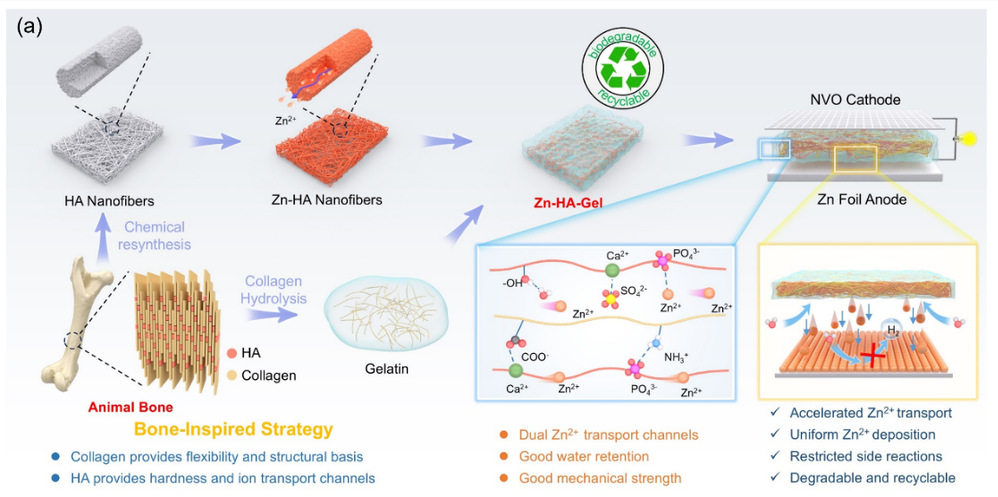Recently, the teams led by Professor Wang Feng and Professor Niu Jin from BUCT published a research paper titled “Bone-Inspired Sustainable Hydrogel Electrolytes for Zn Metal Batteries” in the internationally renowned journal, Angewandte Chemie International Edition. In this work, we have developed a bone-inspired hydrogel electrolyte (Zn-HA-Gel) composed of Zn-doped hydroxyapatite (Zn-HA) nanofibers and a gelatin matrix derived from animal bones. The bone-like structure and strong molecular interactions in the biodegradable, recyclable, and biocompatible components endow Zn-HA-Gel with excellent sustainability, water retention, and mechanical properties, which solves the problems currently associated with Zn anodes.
Notably, the Zn-doped hydroxyapatite possessed a superionic conductive property (18.7 mS cm-1 at room temperature) and strong interactions with electrolyte ions. These provide unique dual-channels for Zn2+ transport and an accelerated Zn2+ desolvation process, affording high ionic conductivity (32.5 mS cm-1) and transference number (0.80). In addition, the Zn-doped hydroxyapatite also guided uniform Zn growth along (002) crystal planes. As a result, the multifunctional electrolyte enabled exceptional performance of AZMBs in both half cells and full cells. The Zn/Zn-HA-Gel/Zn symmetric cell demonstrates stable cycling for 2000 h at 5 mA cm-2/5 mAh cm-2, and also maintains stable operation under a high depth of discharge (76.95% DOD) for 2000 h. The Zn/Zn-HA-Gel/NVO full cell exhibits excellent cycling performance even under conditions of limited N/P ratio and high cathode mass loading. Furthermore, the assembled pouch cell can stably cycle for 500 cycles at 1 A g-1, achieving both high performance and long cycle life.

Illustration of the synthetic process for the Zn-HA nanofibers and the bone-inspired Zn-HA-Gel electrolytes highlighting the mechanism of Zn2+ conduction and the advantages of the material.
The first author of the paper is Peng Jiaying, a PhD student from BUCT. Professor Wang Feng and Professor Niu Jin at the CMSE are co-corresponding authors. Beijing University of Chemical Technology is the first completed unit. This work has been supported by the National Key Research and Development Program and the National Natural Science Foundation.
Article information:
Jiaying Peng, Weihao Song, Wei Zhang, Xinyu Li, Qing Ma, Bing Wu, Masatsugu Fujishige, Kenji Takeuchi, Morinobu Endo, Chendong Ji, Yilin Sun,* Jin Niu,* Feng Wang*. Bone-Inspired Sustainable Hydrogel Electrolytes for Zn Metal Batteries. Angew. Chem. Int. Ed. 2025, e202506449.
Full-text link: https://onlinelibrary.wiley.com/doi/10.1002/anie.202506449


